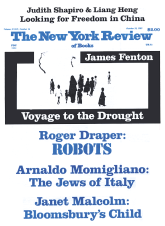What a joy to see a major poet emerging from a hardly differentiated mass of contemporaries and taking the lead in the poetry of my language, a living proof that Polish literature is energy incessantly renewed against all probabilities! Born in 1945, Zagajewski belonged to the angry “generation of 1968” and started by satirizing in both his verse and prose the surreal character of the totalitarian state. While mocking the official language, he gradually developed a taste for expressing the political opposition of his generation through a “naked” speech practically stripped of metaphors. I discovered him then and praised the freshness of his style, not expecting that it marked just a phase in his evolution. For soon he left behind that poetry of political commitment—noble-minded but often one dimensional—and embarked upon a new adventure, a search in a labyrinth where meditation on the flow of time brings together the historical and the metaphysical. His poems have been acquiring a more and more sumptuous texture, and now he appears to me as a skillful weaver whose work is not unlike Gobelin tapestries where trees, flowers, and human figures coexist in the same pattern. That rich and complex world re-created and transformed by art is for him not a place of escape. On the contrary, it is related in a peculiar way to the crude reality of our century, even if it is on the other side of “smooth water, an indifferent wave.”
Zagajewski’s poetry is an homage paid to our Central Europe and to the unity of Europe artificially divided into “the West” and “the East,” much as is the prose of Milan Kundera, of George Konrad, or of Danilo Kis. This unity is symbolized by the cities in which his life unfolded. He cultivates the legend of the city of his birth, Lwów, romantic and international; he grew up in Kraków and there studied philosophy at the six-hundred-year-old university; he, as several generations of the intelligentsia had been, was attracted by Vienna, a cultural center. Those places nourished his imagination and enabled him to converse with mythical European figures, philosophers, painters, and composers of the past. He is not disinherited for he has found his home in the common heritage always present in the very art and architecture that surrounded him in his youth. To judge by the steady increase of his creative power in the last years, his migration to Paris, where he has been living since 1981, did not interrupt, rather guaranteed, the continuity of his work by adding distance and perspective. As I read him, I am inclined to apply his own words to my feeling of wonder:
Only in the beauty created
by others is there consolation.
—Czeslaw Milosz
KIERKEGAARD ON HEGEL
Kierkegaard said of Hegel: He reminds me of someone
who builds an enormous castle but lives himself
in a storehouse next to the construction.
The mind, by the same token, dwells in
the modest quarters of the skull,
and those glorious states
which were promised us are covered
with spiderwebs, for the time being we should enjoy
a cramped cell in the jailhouse, a prisoner’s song,
the good mood of a customs officer, the fist
of a cop. We live in longing. In our dreams,
locks and bolts open up. Who didn’t find shelter
in the huge looks to the small. God
is the smallest poppy seed in the world,
bursting with greatness.
MY MASTERS
My masters are not infallible.
They’re neither Goethe,
who had a sleepless night
only when distant volcanoes moaned, nor Horace,
who wrote in the language of gods
and altar boys. My masters
seek my advice. In fleecy
overcoats hurriedly slipped on
over their dreams, at dawn, when
the cool wind interrogates the birds,
my masters talk in whispers.
I can hear their broken speech.
IN THE ENCYCLOPEDIAS, NO ROOM FOR OSIP MANDELSTAM
In the encyclopedias once again no room for
Osip Mandelstam again he is
homeless still it’s so difficult to find a flat
How to register in Moscow it’s nearly impossible
The Caucasus still calls him Asia’s lowland forest
roars these days haven’t arrived yet
Someone else picks up pebbles on the Black Sea beaches
This shifting investigation goes on though the uniform
is of a new cut and its wooden-headed tailor
almost fell over bowing
You close a book it sounds like a gunshot
White dust from the paper tickles your nose a Latin
evening is here it snows nobody will come tonight
it’s bedtime but if he knocks at your thin door
let him in
This Issue
October 24, 1985



